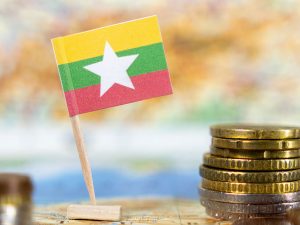
The idea of a world currency has been debated throughout the 20th and 21st century, and several proposals have been made. A world currency could work in theory, and would provide a number of benefits, yet there are several blockers which stand in the way.
In many ways, the euro represents the closest thing we have to a world currency, as it’s currently used by 20 EU countries, and growing. The US dollar is also used in 11 countries, widely used in trade due to dollar dominance, and is considered to be the global reserve currency. Therefore, the US dollar could also be considered to be a form of world currency.
John Maynard Keynes conceptualised the ‘bancor’ in 1940, which was a proposed world unit of account to attempt to stabilise the world economy after the Second World War, but it was rejected by the UK government, in favour of the Bretton Woods System under the US dollar.
But is a world currency actually possible? And what would the advantages and disadvantages be for a universal currency?

Challenges of a universal currency
Currencies are not just exclusive to a singular country, and throughout history, currencies have often been adopted across regions where there is trade, not necessarily exclusive to one nation.
The euro has demonstrated that a particular region (the eurozone) can operate under one currency, and the proposed digital euro could potentially increase the influence and accessibility of this currency.
However, there are some significant challenges which stand in the way of the world adopting one world currency.
Economic diversity
All economies and blocs across the globe have entirely different economic goals, needs and structures. One world currency wouldn’t necessarily benefit everyone. Putting one blanket currency over all the nations of the world could potentially stagnate the world economy and remove the differences which benefit each individual nation fairly.
Sovereignty
Currency acts as a form of control over a nation, allowing a government to control their own monetary policy, imports and exports, and interest rates. A currency used by all nations would have an impossible task of attempting to cater to all countries to allow them their own freedoms. Unfortunately, in reality, a world currency would mean that many weaker nations would surrender a lot of their sovereignty, which could cause conflict.
Furthermore, a world currency would need a central bank, or at least a hub to determine economic policy. This country would have a huge amount of power and influence, and this could be counterproductive to global peace.
Cultural differences
Introducing a world currency would require a cohesion of all political systems and economic philosophies, taking into account the culture of work and economic expectations of the population. It would be a huge feat for one world currency to successfully cater to all these nuances of the world economy.
These three factors can be boiled down into the basic goal of quantitative easing, which is to make borrowing and investing cheaper to encourage spending and lending, therefore boosting the economy.

Advantages of a world currency
Aside from these hurdles, in theory a world currency could work, if perhaps alongside the existing currencies of each country. As mentioned earlier, the US dollar is used by almost all nations as a global reserve currency.
If a world currency was introduced, and was maintained successfully, there would be many potential advantages.
Exchange rate & inflation
Keynes and many other economists have noted that a world currency would be immune to inflation, which is a destructive force in many economies to this day.
Countries would also be discouraged from engaging in competitive exchange rate practices, known as currency wars.
Trade
A world currency would make international business much smoother, as there would be no need for currency exchange. This could even encourage foreign investment, and greater harmony between nations.
Stability
Both of the above factors would lead to a much more stable global economy, which would also be easier to manage and predict. Particularly if a world currency was introduced as a CBDC, it would mean that all economies could be tracked and measured, and exchanges between nations could be instant.

Disadvantages of a world currency
If a world currency were to be introduced successfully, bypassing the challenges listed above, there would still be several disadvantages that would need to be addressed. As with many economic theories, whether a world currency would be effective is still up for debate.
Transition issues
Transitioning all world economies over to this currency would pose a significant challenge, involving logistical and technical changes, and adaptations to financial systems and legal frameworks. These frameworks are often sculpted over time to a country’s needs and demands (for better or for worse), so introducing a new currency may not work at all, and could topple economies that are already fragile.
Wealth inequality
The divide between rich and poor is widening, and a world currency could make it even wider.
Individual economies with their own currencies can increase their value and bring huge profits to the country, and increase demand for their unique currency, such as the case with Bahrain and Kuwait. A world currency would remove this autonomy, and mean that poorer countries would have even less of a chance of competition, and countries such as the US and China would have their economic dominance entrenched even further.
Abuse of power
As well as a potential for wealth inequality, there is a potential danger of an abuse of power. Currencies give individual countries autonomy and control over their own economic policies, which if replaced by a world currency, could be manipulated.
There is also the problem of a central authority, which could be influenced or controlled more heavily by certain nations to benefit their own economies.
Future developments
There are no immediate plans for a world currency. Currently, nations are attempting to wrestle free of dollar dominance, and the petrodollar, so in some ways are actually attempting to move away from a world currency.
The euro represents the closest thing to a world currency, and the digital euro’s development may open up the currency to new opportunities. El Salvador’s introduction of bitcoin as a legal tender has also been an interesting economic experiment to introduce a globally accessible currency, but has so far not been much of a success.
For more currency news and insight into the ever-changing world of currency, make sure to stay up to date with our Expert Analysis, as well as our Market Commentary.
Caleb Hinton
Caleb is a writer specialising in financial copy. He has a background in copywriting, banking, digital wallets, and SEO – and enjoys writing in his spare time too, as well as language learning, chess and investing.



